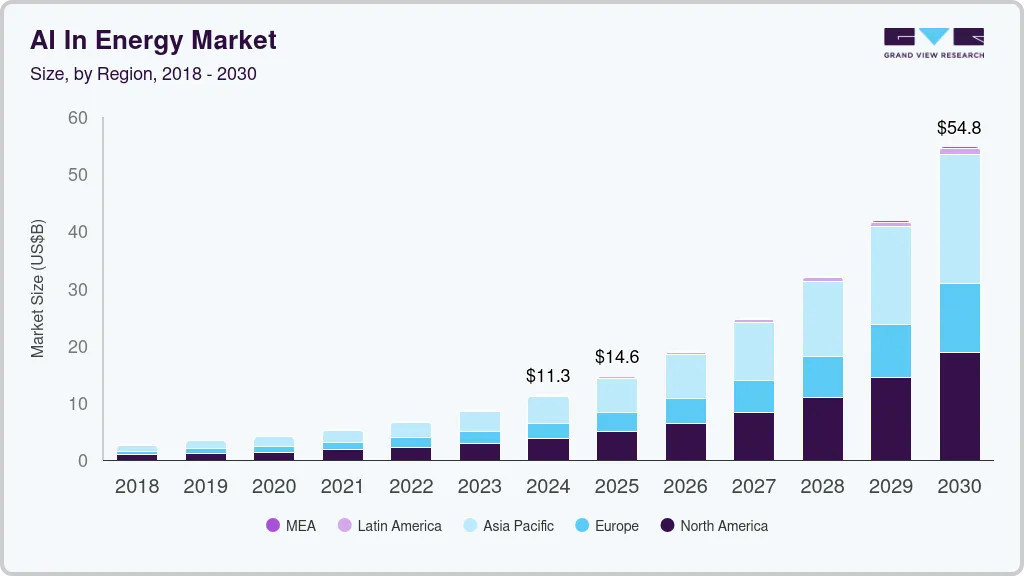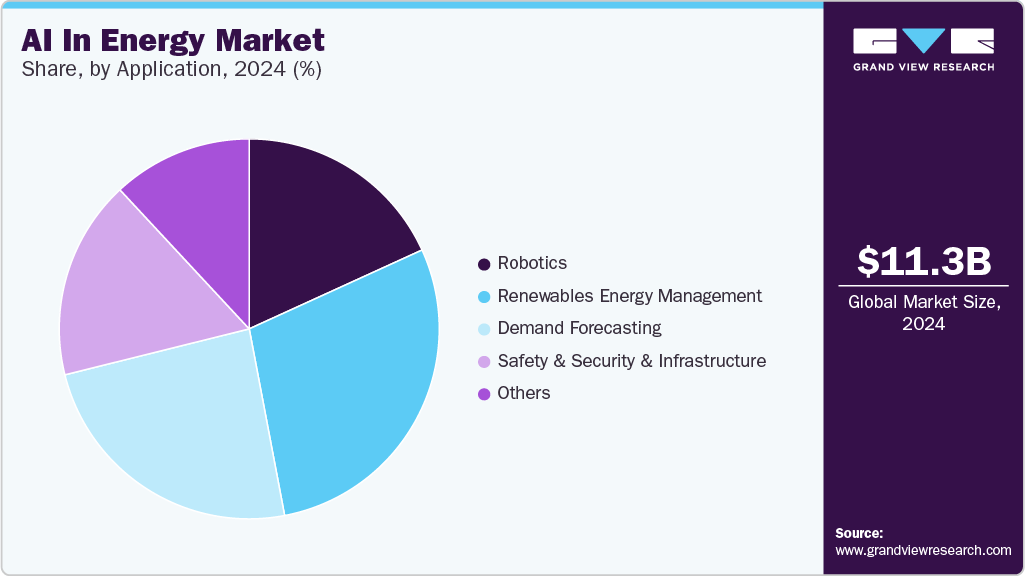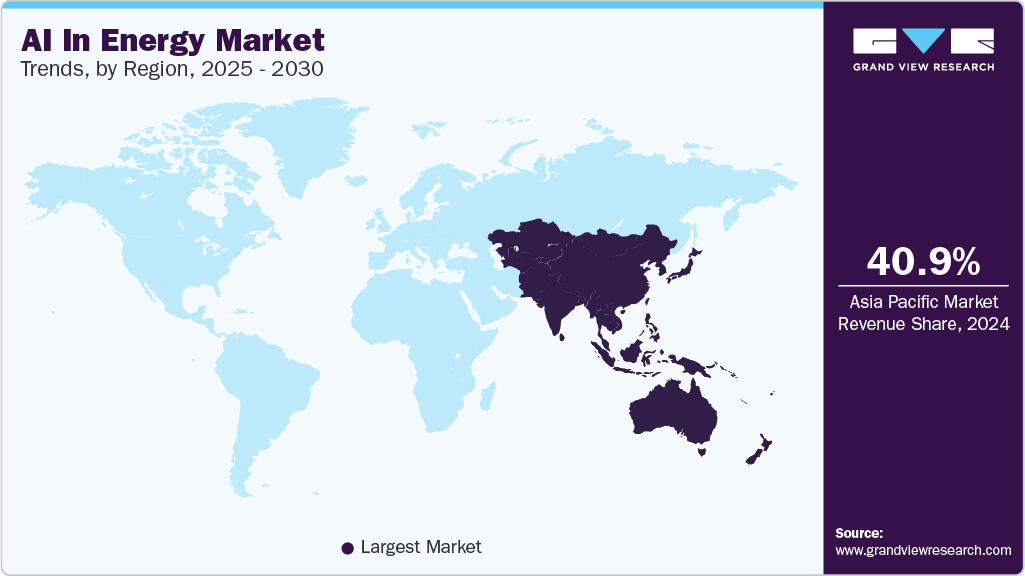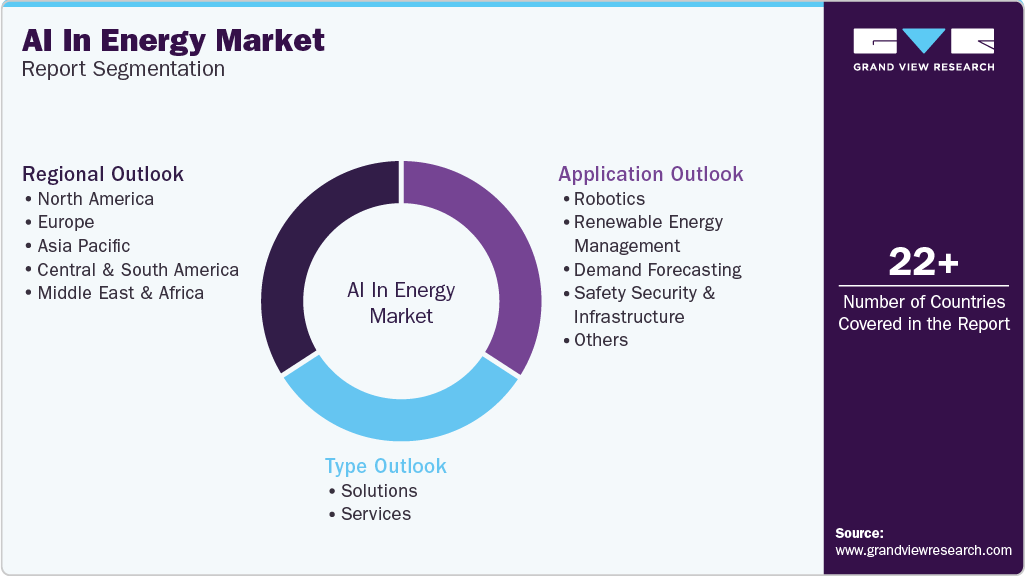- Home
- »
- Power Generation & Storage
- »
-
AI In Energy Market Size & Share, Industry Report, 2030GVR Report cover
![AI In Energy Market Size, Share & Trends Report]()
AI In Energy Market (2025 - 2030) Size, Share & Trends Analysis Report By Type (Solutions, Services), By Application (Robotics, Renewable Energy Management, Demand Forecasting, Safety Security & Infrastructure), By Region, And Segment Forecasts
- Report ID: GVR-4-68040-477-7
- Number of Report Pages: 110
- Format: PDF
- Historical Range: 2018 - 2023
- Forecast Period: 2025 - 2030
- Industry: Energy & Power
- Report Summary
- Table of Contents
- Segmentation
- Methodology
- Download FREE Sample
-
Download Sample Report
AI In Energy Market Summary
The global AI In Energy Market size was estimated at USD 11.30 billion in 2024 and is anticipated to reach USD 54.83 billion by 2030, growing at a CAGR of 30.2% from 2025 to 2030. The increasing demand for energy efficiency and sustainability is propelling companies to adopt AI technologies that optimize energy management and enhance operational efficiencies.
Key Market Trends & Insights
- Asia Pacific artificial intelligence in energy market is dominated the global market and accounted for largest revenue share of 40.93% in 2024.
- China AI in energy market growth is propelled by several key factors, including the government's commitment to advancing renewable energy and achieving carbon neutrality.
- By type, solutions held the market with the largest revenue share of 71.59% in 2024.
- Based on application, renewable energy management held the market with the largest revenue share of 28.83% in 2024.
Market Size & Forecast
- 2024 Market Size: USD 11.30 Billion
- 2030 Projected Market Size: USD 54.83 Billion
- CAGR (2025-2030): 30.2%
- Asia Pacific: Largest market in 2024
AI applications such as predictive analytics, machine learning, and deep learning enable energy firms to analyze vast datasets from smart meters and IoT devices, thereby improving decision-making processes related to grid management and renewable energy integration. Moreover, regulatory pressures for sustainability are compelling organizations to innovate and implement AI-driven solutions that address operational challenges while reducing carbon footprints.
The rise of decentralized energy systems and smart grids further facilitates the adoption of AI, allowing for better load forecasting and resource allocation. Consequently, strategic collaborations among industry players are becoming essential for leveraging technological synergies and expanding market reach, thereby solidifying AI's role as a transformative force in the energy sector.
Drivers, Opportunities & Restraints
A primary driver is the increasing integration of AI technologies with smart grids, improving load forecasting, demand response, and predictive maintenance, enhancing grid reliability and reducing operational costs. The need to modernize aging infrastructure and accommodate the growing share of renewable energy sources also propels market expansion, as AI helps manage the intermittency of renewables like solar and wind.
The global AI in energy market presents numerous opportunities driven by technological advancements and increasing demand for efficiency and sustainability. With the proliferation of IoT devices and big data analytics, energy companies can harness vast datasets to optimize operations, enhance predictive maintenance, and improve energy management systems.
A significant challenge is the high initial investment required for adopting AI technologies, which can be prohibitive for many energy companies, especially those operating in regions with limited financial resources. The complexity of integrating AI systems into existing infrastructure also poses difficulties; many energy systems are built on outdated technologies that require substantial upgrades to accommodate AI solutions.
Type Insights
Solutions held the market with the largest revenue share of 71.59% in 2024. The Artificial Intelligence (AI) solutions in the energy market are experiencing rapid growth, driven by the increasing demand for efficiency and sustainability in energy management. Key applications of AI include predictive maintenance, smart grid management, and optimization of renewable energy sources, which enhance operational efficiencies and reduce costs across various sectors such as energy generation, transmission, and distribution.
Major players are heavily investing in AI technologies to improve grid performance and facilitate the integration of renewable energy into existing infrastructures. Additionally, regulatory pressures for sustainability are prompting companies to adopt AI-driven solutions, making the technology essential for modernizing the energy landscape and addressing challenges related to increasing energy demand and climate change.
Application Insights
Based on Application, Renewable Energy Management held the market with the largest revenue share of 28.83% in 2024. The integration of Artificial Intelligence (AI) in renewable energy management is revolutionizing how energy is produced, distributed, and consumed. AI technologies enhance the efficiency and reliability of renewable energy systems by optimizing operations for solar panels, wind turbines, and other sources. These solutions leverage advanced predictive analytics to forecast energy generation based on weather patterns and historical data, allowing for better alignment of supply with demand.

The increasing adoption of renewable energy sources, such as solar and wind power, is fueling the need for Robotics Power Rentals in substations and switchgear Types. These bushings are designed to provide superior insulation and withstand high electrical stresses while occupying minimal footprint. The trend towards compact and modular electrical applications are further propelling the growth of the robotics AI in energy market, as these bushings enable the integration of advanced features and functionalities into space-constrained Applications.
Regional Insights & Trends
Asia Pacific artificial intelligence in energy market is dominated the global market and accounted for largest revenue share of 40.93% in 2024. The Asia Pacific region is at the forefront of integrating Artificial Intelligence (AI) solutions within the energy market, driven by rapid industrialization, urbanization, and a pressing need for sustainable energy management. Countries such as China and India are leading this transformation, leveraging AI to optimize renewable energy generation, enhance grid management, and improve predictive maintenance.

The growth of AI solutions in the Asia Pacific energy market is driven by several critical factors, including rapid industrialization and urbanization, which have led to increased energy demand across the region. Countries like China and India are at the forefront, implementing AI technologies to enhance energy management systems, optimize renewable energy utilization, and improve grid reliability. Government initiatives focused on sustainability and reducing carbon footprints further catalyze investment in AI-driven solutions, creating a supportive regulatory environment.
China AI In Energy Market Trends
China artificial intelligence in energy market growth is propelled by several key factors, including the government's commitment to advancing renewable energy and achieving carbon neutrality. The integration of AI with emerging technologies such as big data analytics and the Internet of Things enhances operational efficiency and enables smarter energy management, particularly in optimizing power grid investments. National policies, like the New Generation Artificial Intelligence Development Plan, support the development of AI across various sectors, including energy, fostering innovation and investment.
AI in Energy Market in Japan is witnessing growth due tothe government initiatives aimed at reducing carbon emissions and promoting smart city developments further foster the adoption of AI in the energy sector. Additionally, Japan's focus on integrating advanced technologies, such as IoT and big data analytics, enables real-time monitoring and decision-making, essential for managing modern energy systems' complexities. This proactive approach not only supports Japan's transition to a low-carbon economy but also positions it as a leader in the development and implementation of innovative AI-driven energy solutions.
North America AI In Energy Market Trends
North America is a leader in the adoption of Artificial Intelligence (AI) solutions within the energy market, driven by significant technological advancements and a strong focus on renewable energy integration.Major utility companies are investing in AI technologies to optimize energy distribution, improve outage response times, and facilitate the transition to cleaner energy sources. Additionally, government initiatives aimed at promoting sustainability and reducing carbon emissions further encourage the adoption of AI-driven solutions.
The drivers of AI solutions in the U.S. energy market are primarily fueled by the increasing demand for efficiency, sustainability, and advanced technological integration. As the energy sector shifts towards renewable sources, AI plays a crucial role in optimizing energy generation and distribution, particularly in managing the variability of renewable energy supply.
Europe AI In Energy Market Trends
The drivers of AI solutions in the European energy market are largely influenced by a strong commitment to sustainability and stringent regulatory frameworks aimed at reducing carbon emissions. European countries are actively adopting AI technologies to enhance energy efficiency and facilitate the integration of renewable energy sources into their grids. Government initiatives and policies promoting clean energy are significant motivators for investment in AI-driven solutions, enabling utilities to optimize operations, improve grid flexibility, and manage demand more effectively.
Germany AI in energy market is growing due to the country’senergy market is characterized by a strong focus on sustainability and innovation by integrating Artificial Intelligence (AI) solutions. The country is leveraging AI to enhance various aspects of its energy system, including predictive maintenance, operational optimization, and real-time demand forecasting, which are crucial for managing the increasing share of renewable energy sources.
AI in energy market In UK is witnessing growth due to the rise of Ai Solutions in the country’s energy market is driven by several key factors, including the urgent need for sustainability and the transition to renewable energy sources. As the UK aims to reduce carbon emissions and achieve net-zero targets, AI technologies are increasingly being adopted to optimize energy generation, enhance grid management, and improve demand forecasting.
Central & South America AI In Energy Market Trends
The adoption of Artificial Intelligence (AI) solutions in the energy market of Central and South America is gaining momentum, driven by the region's commitment to renewable energy integration and grid modernization. Countries like Brazil and Argentina are leveraging AI to optimize the generation and distribution of clean energy sources, such as solar and wind power. AI-powered predictive maintenance and demand forecasting tools are enhancing operational efficiency and reliability across energy infrastructures.
Middle East & Africa AI In Energy Market Trends
The energy market in the Middle East and Africa is increasingly adopting Artificial Intelligence (AI) solutions, driven by the need for improved efficiency, sustainability, and enhanced operational capabilities. In the Middle East, countries are leveraging AI to optimize the production and management of renewable energy sources, particularly solar and wind, while also enhancing traditional oil and gas operations through predictive maintenance and real-time data analytics.
Key AI In Energy Market Company Insights
The AI in energy market is dominated by major players investing heavily in research and development to advance their AI capabilities. Key companies include Siemens AG, General Electric, Schneider Electric, ABB, Amazon Web Services, and Atos SE. These players are focusing on developing innovative solutions that leverage predictive analytics, machine learning algorithms, and IoT integration to enhance operational efficiencies across the energy value chain.
Key Artificial Intelligence In Energy Companies:
The following are the leading companies in the AI in energy market. These companies collectively hold the largest market share and dictate industry trends.
- Siemens AG
- Alpiq
- SmartCloud Inc.
- ABB
- General Electric
- Hazama Ando Corporation
- ATOS SE
- AppOrchid Inc.
- Zen Robotics Ltd.
- Origami Energy Ltd.
- Flex Ltd.
Recent Developments
-
In May 2024, Schneider Electric launched AI-powered feature for its Wiser Home app, marking a significant advancement in home energy management. This feature enables optimized energy management for two major household power consumers-water heaters and electric vehicle chargers-through a single application. By utilizing predictive algorithms, the AI learns from user habits, real-time weather data, tariff information, and solar production capabilities to effectively shift energy loads.
AI In Energy Market Report Scope
Report Attribute
Details
Market size value in 2025
USD 14.63 billion
Revenue forecast in 2030
USD 54.83 billion
Growth rate
CAGR of 30.2% from 2025 to 2030
Historical data
2018 - 2023
Base Year
2024
Forecast period
2025 - 2030
Quantitative units
Revenue in USD million/billion and CAGR from 2025 to 2030
Report coverage
Revenue forecast, competitive landscape, growth factors and trends
Segments covered
Type, application, region
Regional scope
North America; Europe; Asia Pacific; Central & South America; Middle East & Africa
Country Scope
U.S.; Canada; Mexico; Germany; France; UK; Italy; Spain; Russia; China; India; Japan; Australia; Brazil; Argentina; Saudi Arabia; South Africa; UAE
Key companies profiled
Siemens AG; Alpiq; SmartCloud Inc.; ABB; General Electric; Hazama Ando Corporation; ATOS SE; AppOrchid Inc.; Zen Robotics Ltd.; Origami Energy Ltd.; Flex Ltd.
Customization scope
Free report customization (equivalent up to 8 analyst’s working days) with purchase. Addition or alteration to country, regional & segment scope
Pricing and purchase options
Avail customized purchase options to meet your exact research needs. Explore purchase options
Global AI In Energy Market Report Segmentation
This report forecasts revenue growth at global, regional, and country levels and provides an analysis of the latest industry trends in each of the sub-segments from 2018 to 2030. For this study, Grand View Research has segmented AI in energy market report based on type, application, and region:

-
Type Outlook (Revenue, USD Million, 2018 - 2030)
-
Solutions
-
Services
-
-
Application Outlook (Revenue, USD Million, 2018 - 2030)
-
Robotics
-
Renewable Energy Management
-
Demand Forecasting
-
Safety Security & Infrastructure
-
Others
-
-
Regional Outlook (Revenue, USD Million, 2018 - 2030)
-
North America
-
U.S.
-
Canada
-
Mexico
-
-
Europe
-
Germany
-
UK
-
Italy
-
Spain
-
France
-
Russia
-
-
Asia Pacific
-
China
-
India
-
Japan
-
Australia
-
-
Central & South America
-
Brazil
-
Argentina
-
-
Middle East & Africa
-
Saudi Arabia
-
South Africa
-
UAE
-
-
Frequently Asked Questions About This Report
b. The global AI in energy market size was estimated at USD 11.30 billion in 2024 and is expected to reach USD 14.63 billion in 2025.
b. The global AI in energy market is expected to grow at a compound annual growth rate of 30.24% from 2025 to 2030 to reach USD 54.82 billion by 2030.
b. Based on Type, Solutions held the market with the largest revenue share of 71.59% in 2024. Key applications of AI include predictive maintenance, smart grid management, and optimization of renewable energy sources, which enhance operational efficiencies and reduce costs across various sectors such as energy generation, transmission, and distribution.
b. Some of the key vendors of the global AI in energy market are Siemens AG, Alpiq, SmartCloud Inc., ABB, General Electric, among others.
b. Key drivers include the increasing integration of renewable energy sources, where AI helps manage their intermittent nature through advanced predictive analytics and real-time decision-making tools.
Share this report with your colleague or friend.
Need a Tailored Report?
Customize this report to your needs — add regions, segments, or data points, with 20% free customization.

ISO 9001:2015 & 27001:2022 Certified
We are GDPR and CCPA compliant! Your transaction & personal information is safe and secure. For more details, please read our privacy policy.
Trusted market insights - try a free sample
See how our reports are structured and why industry leaders rely on Grand View Research. Get a free sample or ask us to tailor this report to your needs.










